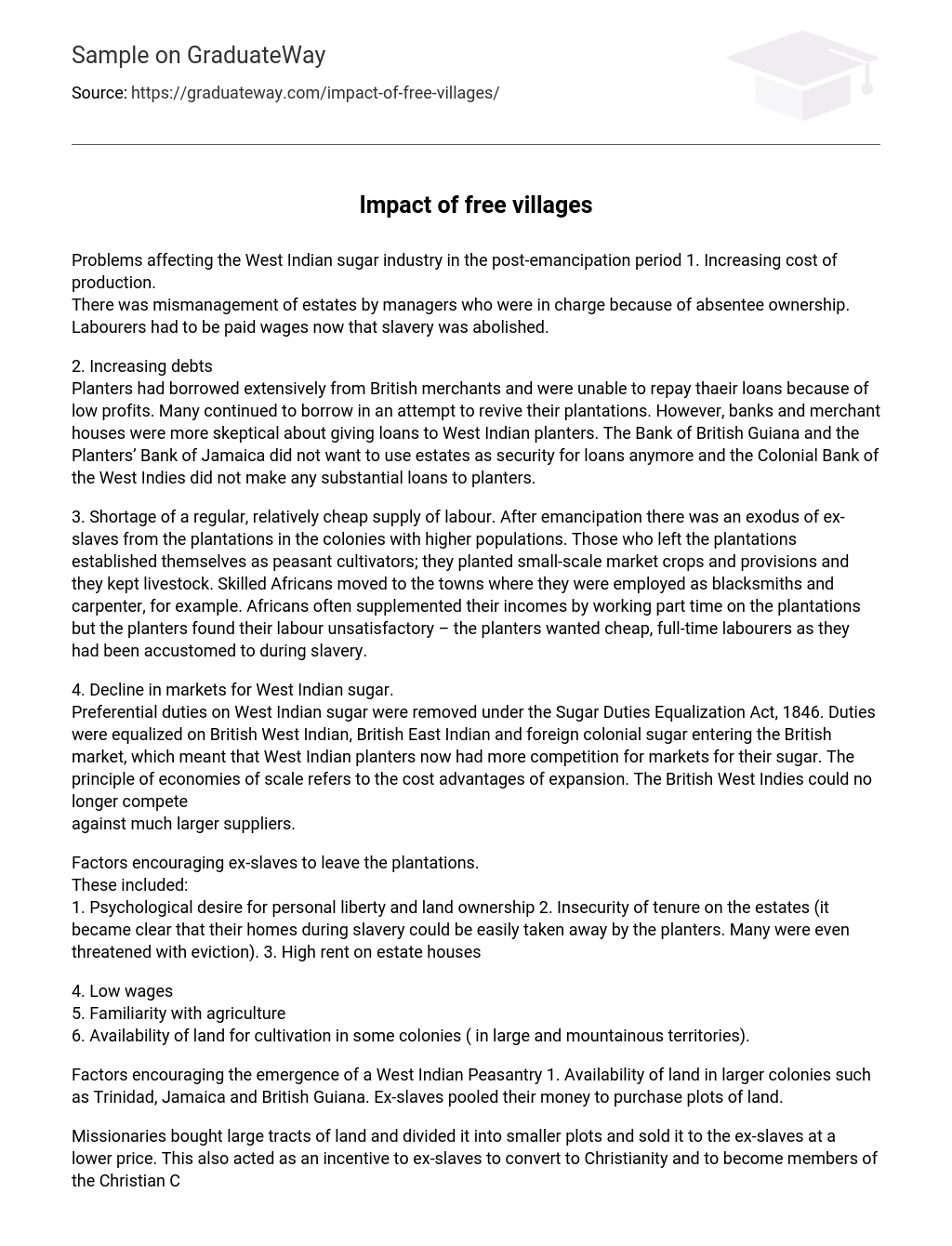Problems affecting the West Indian sugar industry in the post-emancipation period 1. Increasing cost of production.
There was mismanagement of estates by managers who were in charge because of absentee ownership. Labourers had to be paid wages now that slavery was abolished.
2. Increasing debts
Planters had borrowed extensively from British merchants and were unable to repay thaeir loans because of low profits. Many continued to borrow in an attempt to revive their plantations. However, banks and merchant houses were more skeptical about giving loans to West Indian planters. The Bank of British Guiana and the Planters’ Bank of Jamaica did not want to use estates as security for loans anymore and the Colonial Bank of the West Indies did not make any substantial loans to planters.
3. Shortage of a regular, relatively cheap supply of labour. After emancipation there was an exodus of ex-slaves from the plantations in the colonies with higher populations. Those who left the plantations established themselves as peasant cultivators; they planted small-scale market crops and provisions and they kept livestock. Skilled Africans moved to the towns where they were employed as blacksmiths and carpenter, for example. Africans often supplemented their incomes by working part time on the plantations but the planters found their labour unsatisfactory – the planters wanted cheap, full-time labourers as they had been accustomed to during slavery.
4. Decline in markets for West Indian sugar.
Preferential duties on West Indian sugar were removed under the Sugar Duties Equalization Act, 1846. Duties were equalized on British West Indian, British East Indian and foreign colonial sugar entering the British market, which meant that West Indian planters now had more competition for markets for their sugar. The principle of economies of scale refers to the cost advantages of expansion. The British West Indies could no longer compete
against much larger suppliers.
Factors encouraging ex-slaves to leave the plantations.
These included:
1. Psychological desire for personal liberty and land ownership 2. Insecurity of tenure on the estates (it became clear that their homes during slavery could be easily taken away by the planters. Many were even threatened with eviction). 3. High rent on estate houses
4. Low wages
5. Familiarity with agriculture
6. Availability of land for cultivation in some colonies ( in large and mountainous territories).
Factors encouraging the emergence of a West Indian Peasantry 1. Availability of land in larger colonies such as Trinidad, Jamaica and British Guiana. Ex-slaves pooled their money to purchase plots of land.
Missionaries bought large tracts of land and divided it into smaller plots and sold it to the ex-slaves at a lower price. This also acted as an incentive to ex-slaves to convert to Christianity and to become members of the Christian Churches. Many ex-slaves squatted on Crown Land where available.
Some estates were abandoned and the land sold at a low cost to the ex-slaves.
2. Experience as ‘small-scale farmers’ during enslavement Enslaved Africans were allowed to cultivate provision grounds and this experience may have helped convince them to move away from the plantations. Some had sold their produce in the Sunday markets and were able to save small sums of money which helped to buy land when they became free.
3. Work of missionaries
Missionary groups assisted in the acquisition of land.
They helped in the growth of the Free Village movement.
In Jamaica, Baptist ministers assisted by bargaining with landowners to get land at a lower cost.
Factors hindering the development of a West Indian peasantry 1. There were problems with the acquisition of land due to high rents, lack of Crown Land and planters’ reluctance to sell land.
2. Planters charged high rents on land and the peasants could not afford these.
3. Planters used legislation, such as the Squatters and Tenancy Act, to make it difficult for peasants to acquire land.
4. Issues such as poor development of roads, would limit the farmers’ access to markets with their crops.





